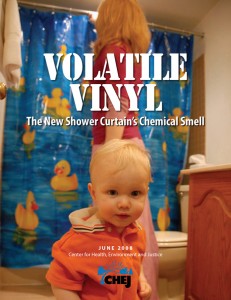How to Get Rid of New Vinyl Smell
Know that new plastic shower curtain smell? Smells good you say? Well not so fast.
The familiar new shower curtain smell may be toxic to your health.
When you open a new PVC (aka vinyl) shower curtain, you're immediately hit with a strong chemical odor, which may persist in your home for days, weeks, or even months. This "new shower curtain smell" may even make you feel nauseous, give you a headache, or make you feel sick.
Why? Shower curtains manufactured out of PVC release chemicals into your home where you hang it. Even worse -- some of these chemicals may be toxic to your health.
To determine which chemicals are causing this intense odor, in 2008 CHEJ commissioned two scientific laboratories to put PVC shower curtains to the test. It's been a few years since we published our report and think it's about time we revisited it.
PVC shower curtains release toxic chemicals into the air.
"It smells sort of like gasoline. It stunk up almost my whole house. At first we thought we had a gas leak it was so bad and then realized it was the new shower curtain we put up today...I went back to smell the plastic bag that it comes in and almost got sick. I know shower curtains usually have that new smell, but never have I ever smelled one like this."
- Consumer complaining about PVC chemical odor.
We got interested in shower curtains partially because of consumer complaints such as the one above, but also because in 2002 researchers at the U.S. EPA found one new vinyl shower curtain can release, "elevated indoor air toxics concentrations...for more than a month" which led the EPA researchers to recommend, "caution should be exercised when opening the bag of a newly bought shower curtain to minimize the exposure risk."
We decided we needed to do our own investigation to put shower curtains to the test, and hired two independent scientific laboratories to study vinyl curtains.
Our study found PVC shower curtains can release as many as 108 volatile organic compounds (VOCs) into the air. That's right, 108! Some of the chemicals were found in the air even 28 days after a PVC shower curtain was unwrapped and hung. Here's the Executive Summary of our report.
VOCs are chemicals that easily turn into gases and contaminate our air. Some of the chemicals we found cause developmental damage as well as damage to the liver and central nervous, respiratory, and reproductive systems. Some can cause cancer in animals; some are suspected or known to cause cancer in humans. The US EPA classifies seven of the chemicals released as hazardous air pollutants.
Our study found PVC shower curtains also contain other dangerous chemicals like phthalates and organotins that may be released into the air.
Indoor air pollution.
Our study found PVC shower curtains are a significant source of indoor air pollution. The combined level of all the VOC's (also known as Total VOC's) was over 16 times greater than the recommended guidelines for indoor air quality established by the U.S. Green Building Council and Washington State Indoor Air Quality Program.
Why does this matter?
For one, since people spend a large portion of time in their home, they may be exposed to harmful levels of chemicals released from PVC shower curtains, as well as other PVC consumer and building products. The US EPA has ranked indoor air pollution 4th in cancer risk among the top 13 environmental problems analyzed and has also been ranked a major risk to human health by the World Health Organization and American Lung Association. Indoor concentrations of VOCs have been found to be greater than outdoor levels: one study found indoor levels up to ten times higher than those outdoors, even in locations with significant outdoor air pollution sources
Our test results are consistent with previous US and Danish EPA tests.
The US EPA has conducted two separate studies which found similar results to our investigation. One study focused on emissions of four chemicals released from PVC shower curtains: toluene, phenol, ethylbenzene, and MIBK. The EPA found elevated indoor concentrations of all four of these substances. All four of these chemicals were also detected in this study and are among the five highest levels found in our study. A study by the Danish EPA found PVC shower curtains contain organotins and high levels of the phthalate DEHP. Our study also found high levels of DEHP and organotins in 3 out of 5 curtains tested.
Our chemical regulatory system is broken and failing to protect us.
Our investigation underscores how federal laws such as Toxic Substances Control Act (TSCA) have failed to protect us from toxic chemicals in consumer products and inside our homes. Our results build on a growing body of evidence, such as bisphenol A (BPA), that our government is failing us, and we need reform now.
Families can take simple steps to protect their health.
Fortunately, there are some things we can do to take action in the interim. Here are some simple tips on what you can do to protect your family's health:
1) Avoid shower curtains made with PVC, as well as other PVC products. These products are not always labeled although some may be labeled as "vinyl" or "PVC" or the number "3" inside the universal recycling symbol.
2) Families – especially those with children -- need to make the common sense choice and buy safer PVC- free shower curtains to prevent any possible harm coming to them from potentially toxic shower curtains.
3) Purchase PVC-free shower curtains made out of safer materials such as organic cotton, nylon, polyester, EVA or PEVA plastic. Note - EVA and PEVA are sometimes referred to as "vinyl", but are not the same type of plastic as PVC. To learn more about this, read this article from the Healthy Building Network.
This posted originally appeared at CHEJ's Backyard Talk blog.
How to Get Rid of New Vinyl Smell
Source: https://www.momsrising.org/blog/eww-whats-that-stench-volatile-vinyl